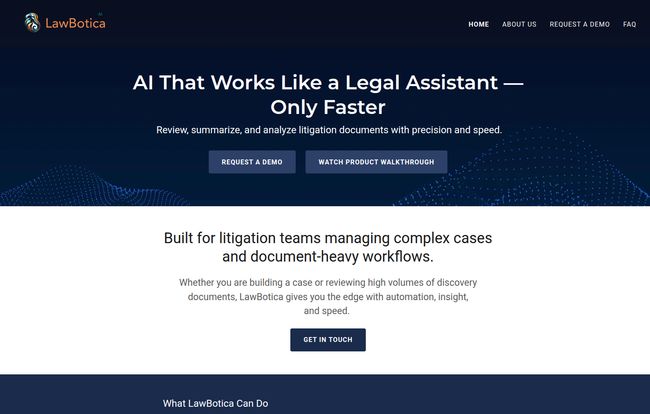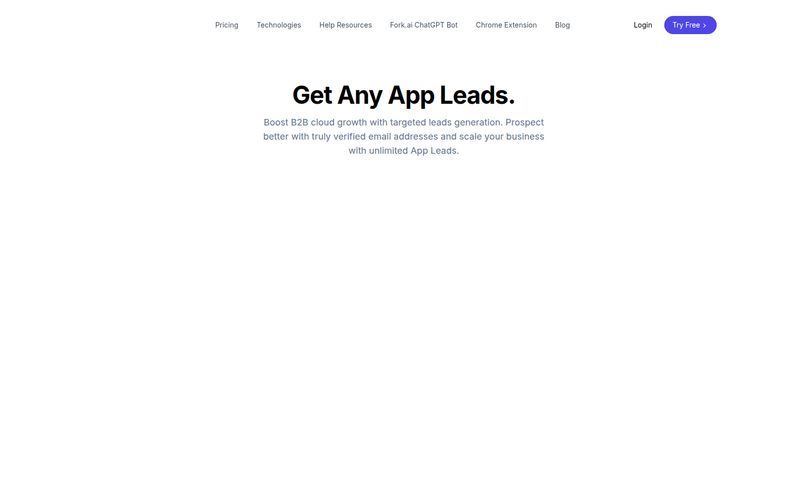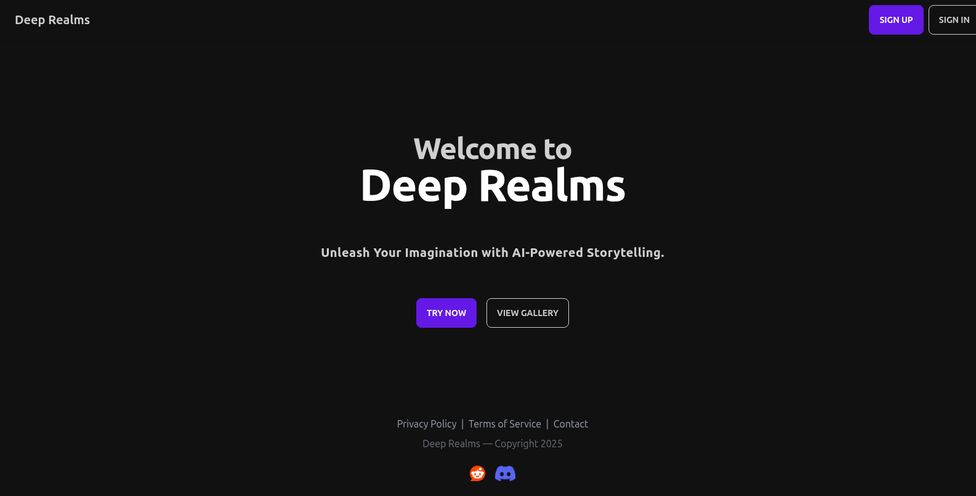If you’re in litigation, you’ve had that moment. The one where a paralegal wheels in a cart stacked high with boxes of discovery, and your soul just… deflates. We’ve all been there, staring at a mountain of paper (or a folder of 10,000 PDFs) and feeling the billable hours drain away into the abyss of manual document review. For years, we've heard whispers and then shouts about AI changing the game. But a lot of it has felt like hype, a solution looking for a problem.
Then I stumbled across LawBotica. Another AI legal assistant? Sure. But this one felt a little different. It wasn’t just screaming “AI!” from the rooftops; it was speaking the language of litigation workflows. It claims to be an AI that works like a legal assistant, only faster. That's a bold claim. So, naturally, I had to see what was under the hood.

Visit LawBotica
So, What’s the Big Deal with LawBotica?
First off, this isn't just a fancy front-end for ChatGPT. The team behind LawBotica makes it clear that their platform is purpose-built for the messy world of litigation. The secret sauce, they say, is a proprietary Legal Language Model (LLM). This is a big deal. Instead of using a generalist AI that knows a little about everything from Shakespeare to quantum physics, LawBotica’s brain has been trained specifically on legal documents, terminology, and reasoning. It’s like hiring a paralegal who has only ever studied case law and deposition transcripts their entire life. They're not going to get distracted by irrelevant information because their world is litigation.
It's developed in the U.S. by people who have actually been in the trenches of legal tech. That context matters. They understand that a lawyer's needs are very different from, say, a marketer's or a software developer's.
A Look Under the Hood at LawBotica’s Features
A tool is only as good as what it can actually do. LawBotica packs in a few features that genuinely seem to address the biggest time-sinks in a case.
The End of Manual Document Slogging?
The Document Review Assistant is the core of the platform. Think of it as a super-powered search function with a brain. It automates sifting through depositions, complaints, medical records, and expert reports to find the key issues and facts. It can build timelines from unstructured data—like turning a dense medical history into a clean, chronological list of events. For anyone who has spent a weekend with highlighters and sticky notes trying to build a case timeline, that feature alone is pretty compelling.
Having a Conversation with Your Case File
This is where things get a bit futuristic. The Multi-Document Chat is exactly what it sounds like. You can upload dozens of documents—depositions, motions, emails, whatever—and then ask questions. “What did Witness John Smith say about the red car?” or “Find all references to the 'subsidiary agreement' across these 50 emails.” The AI doesn't just search for keywords; it understands the context and gives you a synthesized answer, complete with source citations from the documents you provided. It's like having a deposition in front of you that you can cross-examine in plain English.
Getting Summaries That Won’t Get You Sanctioned
We’ve all seen AI summaries that are… creative. They can “hallucinate” facts, which is a mild inconvenience for a blogger but a potential malpractice suit for a lawyer. LawBotica pushes its Explainable AI Summarization hard. When it generates a summary, it provides transparent citations right back to the source document. You can see why it concluded something, which is absolutely critical for legal work. You can't just tell a judge “the AI said so.” You need to be able to point to page 47, line 12. This focus on transparent reasoning builds a layer of trust that’s often missing from general AI tools.
A Leg Up for Personal Injury Firms
They’ve also built a dedicated tool for Strategic Analysis for Personal Injury Claims. This tells me they understand the power of niching down. The AI can help assess case strengths and weaknesses, analyze medical narratives, and probably help calculate damages. It’s a specific solution for a specific, and very document-heavy, practice area.
The Good, The Bad, and The AI
No tool is perfect, right? From what I can gather, the advantages are pretty clear. You get a massive efficiency boost by automating tedious work. The collaborative workspaces mean your entire team can work from the same set of facts and insights, which is great for consistency. And the customization options—from practice-specific interfaces to a full on-premise deployment for firms with Fort Knox-level data security needs—are a huge plus.
But let's be realists. The first con is the inherent reliance on AI accuracy. Even with a specialized LLM, you can't just blindly trust its output. A human lawyer always needs to be the final checkpoint. This is an assistant, not a replacement. Secondly, there’s likely a learning curve. Powerful software requires some training to get the most out of it. Finally, there's the cost. Flexible, customizable, on-premise solutions are fantastic, but they don't scream 'budget-friendly.' Which brings us to the big question…
The Million-Dollar Question: LawBotica's Pricing
So, what does this all cost? I went looking for a pricing page. And I found… a 404 error. Yep, a “Page Not Found.” Honestly, I almost respect it. Instead of a page, you’re funneled towards a “Request a Demo” button.
In my experience in the tech world, this pricing strategy—or lack thereof—tells you a few things:
- It’s not a simple SaaS model. The price likely depends heavily on the size of your firm, the features you need, and your deployment choice (cloud vs. on-premise).
- They are targeting firms, not solo practitioners. This is an enterprise-level solution, and the sales process is consultative. They want to talk to you to figure out a custom package.
- It probably isn't cheap. But it might not have to be. The value proposition is based on saving hundreds of hours of expensive lawyer/paralegal time. The ROI could be massive, but the initial investment might be significant.
The fact that you can get an on-premise installation, where the software runs on your firm's own servers and no data ever leaves your control, is a major selling point for cybersecurity-conscious firms. That kind of thing always comes at a premium.
Who Should Be Requesting That Demo?
Based on its features and positioning, LawBotica seems tailor-made for a few specific groups. Mid-to-large-sized law firms drowning in complex litigation would be the prime candidates. Personal injury practices that handle a high volume of cases with extensive medical records could see a huge benefit. Basically, if your firm’s biggest bottleneck is the time and manpower it takes to review, analyze, and synthesize mountains of documents, then you’re the person LawBotica wants to talk to.
Frequently Asked Questions about LawBotica
How is LawBotica different from a general AI like ChatGPT?
The main difference is its specialization. LawBotica uses a custom-trained Legal Language Model (LLM) that focuses exclusively on litigation documents and workflows. This leads to more accurate, context-aware results and features like explainable summarization with direct citations, which general AIs often struggle with.
Is my confidential client data secure?
Security seems to be a major focus. LawBotica offers versatile deployment options, including a cloud-based SaaS model and, importantly, an on-premise solution. The on-premise option means the software runs entirely on your firm's private servers, so confidential data never leaves your control.
Do I need to be a tech expert to use it?
While any powerful software has a learning curve, LawBotica is designed to fit into existing legal workflows. The interface appears intuitive, with features like the natural language chat. However, it's reasonable to expect some initial training to master all its capabilities, which is common for specialized professional software.
Can it handle very large and complex cases?
That seems to be its primary purpose. Features like multi-document chat across dozens of files, timeline building, and collaborative workspaces are all geared towards managing the complexity and sheer volume of documents found in large-scale litigation.
Is there a free trial?
There is no mention of a free trial on the website. The primary call to action is to "Request a Demo." Typically, access to a trial or pilot program would be discussed during or after this demonstration, as part of the sales process for enterprise software.
Is LawBotica the Future of Law?
Look, AI isn't going to replace good lawyers. Judgement, strategy, and empathy are still uniquely human. But tools like LawBotica represent the next evolution of the legal toolkit. It’s not about replacement; it's about augmentation. It’s about giving lawyers the power to get to the core facts of a case faster, freeing them up to focus on what they do best: building a strategy and advocating for their clients.
While the hidden pricing might be a hurdle for some, the specialized nature of LawBotica makes it a seriously intriguing contender in the legal tech space. It’s not just another piece of tech. It’s a purpose-built machine designed to tackle one of the oldest and most painful parts of practicing law. And for any firm feeling buried under paperwork, that’s a very interesting proposition indeed.



